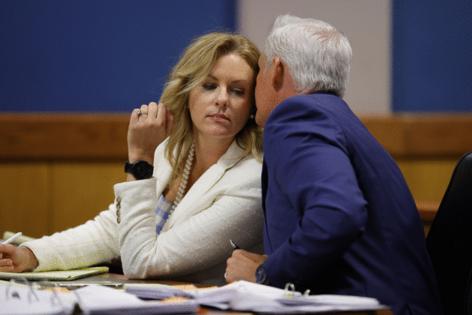Attorney who sought to remove Fulton DA Fani Willis: I had no choice but to act
Published in Political News
ATLANTA — Metro Atlanta defense attorney Ashleigh Merchant dropped the legal equivalent of a bomb in early January when she accused Fulton County District Attorney Fani Willis of being in an “improper, clandestine personal relationship” with her top prosecutor on the election interference case.
Merchant’s court motion, which alleged Willis had a financial conflict of interest, all but sidelined the case against former President Donald Trump and 14 others for more than two months. While Fulton Superior Court Judge Scott McAfee ultimately decided that Willis could stay on the case, his ruling prompted the resignation of special prosecutor Nathan Wade and featured damning conclusions about the DA’s judgment and unsettling questions about her veracity.
Merchant’s driving role in the disqualification saga has also led to a deluge of criticism from both Fulton prosecutors and Willis supporters. Some have labeled her a racist and a liar, others a tool of Trump and the GOP. Some critics accused her of engaging in sleazy tactics to distract from the importance of the underlying case.
But in an interview with Breakdown, The Atlanta Journal-Constitution’s award-winning podcast, Merchant insisted that neither Trump nor her client, the GOP operative Michael Roman, had any role in her research that led to the motion. And she shed light on her motivations behind the disqualification effort.
“I didn’t feel like I had a lot of choice,” Merchant said. “What if I don’t file it and my client gets convicted and he goes to prison? First of all, I have to be okay with that... But second of all, I have to be on the witness stand one day in a habeas (corpus hearing) explaining why I had this document that had legal merit and I didn’t file it.”
Merchant said that being fearful about her professional reputation, relationships or personal attacks was “not a good enough answer” when it came to her constitutional duty of fighting for her client.
Listen to the full interview on Breakdown . Here are some highlights:
On her thoughts as she filed her January 8 motion to disqualify Willis:
“I knew that I had to file something by January 8th (the deadline for pre-trial motions). In a perfect world, I probably would have waited longer and gotten more information, but one of the things about criminal defense is we have subpoena power, but only when we have a court date. So I’m trying to get all this evidence and information by talking to witnesses who did not necessarily want to help me because they thought helping me would help President Trump, and they didn’t want to do that. And so a lot of the witnesses were like, ‘I don’t wanna help your side. I’ll testify if I’m subpoenaed, but I don’t wanna talk to you voluntarily.’ So I knew I needed that subpoena power. I knew I needed that evidentiary hearing in order to actually get on the record that evidence. A lot of businesses, they’ll give us documents, but they’re only gonna give them once we have a subpoena. So having that evidentiary hearing was really important.
“It was really difficult to file it. I sat in the same chair I’m sitting in now the day of the deadline and my paralegal was sitting in the chair right across from me and kept saying, ‘are you ready to file? Are you ready to file?’ And I was like, not yet, not yet, not yet. It’s a lot to file and it’s a lot to have out there and to hit the send button.”
...continued
©2024 The Atlanta Journal-Constitution. Visit at ajc.com. Distributed by Tribune Content Agency, LLC.







Comments